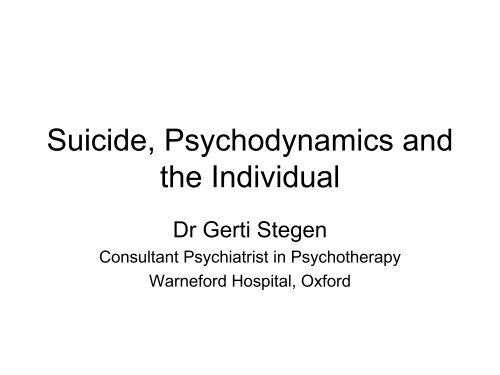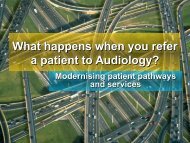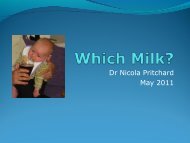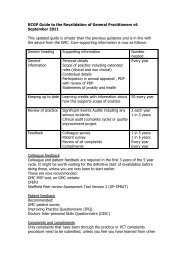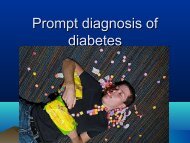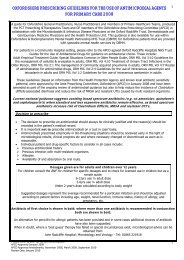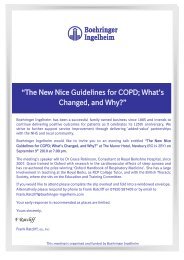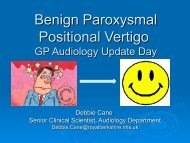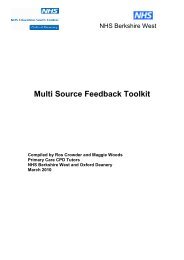Deliberate Self Harm and Suicide, GP, 300507.pdf
Deliberate Self Harm and Suicide, GP, 300507.pdf
Deliberate Self Harm and Suicide, GP, 300507.pdf
You also want an ePaper? Increase the reach of your titles
YUMPU automatically turns print PDFs into web optimized ePapers that Google loves.
<strong>Suicide</strong>, Psychodynamics <strong>and</strong><br />
the Individual<br />
Dr Gerti Stegen<br />
Consultant Psychiatrist in Psychotherapy<br />
Warneford Hospital, Oxford
Is it a Problem?<br />
• 1 in 15 doctors will be dependant on drugs<br />
<strong>and</strong>/or alcohol<br />
• 28% of doctors have above threshold levels of<br />
stress vs 18% in general population<br />
• Doctors suffer a higher burden of mental illness<br />
than those in equivalent professional careers<br />
• Doctors have higher stress, anxiety <strong>and</strong><br />
depression rates than comparable professional<br />
groups<br />
• Doctors have an increased risk of committing<br />
suicide vs general population <strong>and</strong> other<br />
professional groups
Is it a Problem for <strong>GP</strong>s?<br />
• About half of <strong>GP</strong>s have borderline or more<br />
severe anxiety<br />
• A quarter of <strong>GP</strong>s diagnosed with at least<br />
borderline depression<br />
• More <strong>GP</strong>s than consultants report suicidal<br />
thoughts<br />
• General Practice (as speciality) has higher<br />
suicide rate than general medicine
Why is it a Problem?<br />
• Research focus on ‘stressors’<br />
• High expectations of others, adverse media<br />
publicity, working environment, dealing with<br />
problem patients, worry about complaints,<br />
finding a locum, arranging hospital admissions,<br />
dealing with terminal illness<br />
• <strong>GP</strong>s overbook, start surgeries late, over-commit,<br />
do not allow for emergency patients, allow<br />
inappropriate interruptions
What is behind the Problem<br />
• Shifting NHS structure<br />
• Organisational dynamics within surgery<br />
• The doctor:<br />
“Wanted – Medical staff: High achievers only; strong<br />
perfectionist <strong>and</strong> self critical traits preferred; 5<br />
years training in booze-soaked student culture; sleepdeprivation<br />
<strong>and</strong> long hours in your twenties; regular<br />
exposure to death <strong>and</strong> human misfortune; neverending<br />
exams <strong>and</strong> lifelong study required; constant,<br />
onerous responsibility for other people’s health <strong>and</strong><br />
wellbeing; strict, hierarchical, conservative training<br />
with a hint of bullying <strong>and</strong> intimidation; well-paid job,<br />
held in high regard by public, rewarding vocation;<br />
easy access to pharmaceuticals”
‘Medical Personality Traits’?<br />
– Perfectionism (e.g. portray healthy image)<br />
– Compulsivity<br />
– Highly self critical<br />
– Confidentiality worries<br />
– Isolate self (e.g. not registered with <strong>GP</strong>)<br />
– <strong>Self</strong>-prescribe <strong>and</strong> own solutions (e.g.<br />
alcohol)<br />
– Work when sick (<strong>GP</strong>s > consultants)
‘Medical or General Personality Traits’?<br />
– Mental health problems as a result of working in<br />
medicine or increased likelihood of psychologically<br />
vulnerable personalities before medical schools?<br />
– Doctors with least stable childhood most vulnerable to<br />
occupational stress (e.g. correlation between<br />
interpersonal difficulties with seniors <strong>and</strong> perception<br />
of strict, intolerant, hard-to-please father)<br />
– Unconscious drives <strong>and</strong> unresolved childhood<br />
conflicts motivate the study of medicine to increase<br />
own well-being by healing others (e.g. making good of<br />
sibling rivalries)<br />
– Quality of early relationships with parents predicts<br />
development of job stress <strong>and</strong> attitude to work
Potential Psychological Dynamics<br />
• Transference: Earlier feelings derived from a<br />
past relationship (mostly parents) are transferred<br />
to a current relationship, e.g. the doctor, friends,<br />
partners, therapist; ubiquitous, unconscious<br />
• Countertransference: Transference of the<br />
therapist/doctor to the patient; a response to the<br />
patient (diagnostic) or derived from within the<br />
therapist/doctor; unconscious<br />
• Defence mechanisms: Almost entirely<br />
unconscious; ubiquitous; essential for mental<br />
health; pathological if overused
Some Defence Mechanisms<br />
• Displacement: Basis of transference; redirection of<br />
feelings towards a relatively less cared-for person<br />
(‘kicking the cat’)<br />
• Repression: An unacceptable internal idea, affect,<br />
impulse is removed from consciousness<br />
• Intellectualisation: Excessive use of intellectual<br />
processes to avoid emotional expression <strong>and</strong> experience<br />
• Humour: Emotional conflict <strong>and</strong> stressors are dealt with<br />
by emphasising amusing, ironic aspects (cynicism)
•Projection: Attribution of one’s own feelings or<br />
wishes to someone else (‘sad cat’); basis of<br />
paranoid states, paranoid personality disorder,<br />
prejudice<br />
•Splitting: Split external+internal world into<br />
‘good’/ ‘bad’<br />
•Denial: Allows for control of response to<br />
external events; involves splitting: cognitive<br />
acceptance of a painful event whilst associated<br />
painful emotions are repudiated<br />
•Turning on the self: An unacceptable idea,<br />
affect, impulse is directed against the self whilst<br />
related to another person
Assumptions about <strong>Suicide</strong><br />
• Seen to be part of a<br />
depressive state<br />
• A cry for help<br />
• Manipulative<br />
• Solitary, suicide of anomie
Psychodynamics of <strong>Suicide</strong><br />
• “No one kills himself who has never<br />
wanted to kill another or at least wished<br />
the death of another”<br />
• Homicidal anger turned against the self<br />
• Acting out of an emotion (short cut of<br />
unconscious impulse direct to action<br />
bypassing conscious thought <strong>and</strong> feeling)<br />
• Conflict resolution by use/destruction of<br />
the body
• Practical solutions<br />
What could help?<br />
• Being aware of own transferences <strong>and</strong><br />
defences can help<br />
• Consider possibility of being the recipient<br />
of someone else’s transferences <strong>and</strong><br />
defence mechanisms can also help<br />
• Exploring psychodynamic issues in<br />
seminars <strong>and</strong> counselling


